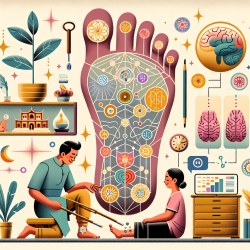Introduction
As a speech-language pathologist, you're dedicated to enhancing communication and mental health outcomes for children. In Indigenous communities, understanding the cultural context is crucial. The recent study titled "Cultural efficacy as a novel component of understanding linkages between culture and mental health in Indigenous communities" offers groundbreaking insights into how cultural efficacy can impact mental health.
Understanding Cultural Efficacy
Cultural efficacy refers to an individual's confidence and ability to engage with their cultural heritage. This concept is especially pertinent in Indigenous communities, where cultural practices are deeply intertwined with mental health and wellbeing. The study highlights that while enculturation—being embedded in one's cultural group—has a direct positive effect on mental health, its benefits are amplified when mediated through cultural efficacy.
Key Findings from the Study
- Enculturation and Anxiety: Enculturation alone was found to have a positive association with anxiety. However, when cultural efficacy was factored in, the indirect effects showed a reduction in anxiety.
- Positive Mental Health: Cultural efficacy was positively associated with mental health, indicating that individuals who feel confident in their cultural engagement report better mental health outcomes.
- Role of Practitioners: Practitioners can play a pivotal role in fostering cultural efficacy by encouraging cultural engagement and providing resources that support cultural learning and participation.
Implications for Practitioners
For practitioners working with Indigenous populations, incorporating cultural efficacy into therapeutic practices can lead to improved outcomes. Here are some actionable steps:
- Encourage Cultural Engagement: Facilitate opportunities for clients to participate in cultural activities, such as language classes, traditional arts, or community events.
- Build Confidence: Work with clients to build their confidence in cultural settings. This might involve role-playing or providing information on cultural protocols.
- Collaborate with Cultural Leaders: Partner with cultural leaders and elders to provide clients with mentorship and guidance in cultural practices.
Encouraging Further Research
While this study provides valuable insights, it also highlights the need for further research. Understanding the nuances of cultural efficacy and its impact on mental health requires ongoing exploration. Practitioners are encouraged to engage with Indigenous communities in participatory research to co-create culturally relevant therapeutic practices.
Conclusion
Cultural efficacy is a powerful tool in improving mental health outcomes in Indigenous communities. By integrating cultural efficacy into therapy, practitioners can help clients navigate the complexities of cultural identity and mental health. This approach not only benefits individuals but also supports broader cultural revitalization efforts.
To read the original research paper, please follow this link: Cultural efficacy as a novel component of understanding linkages between culture and mental health in Indigenous communities.










